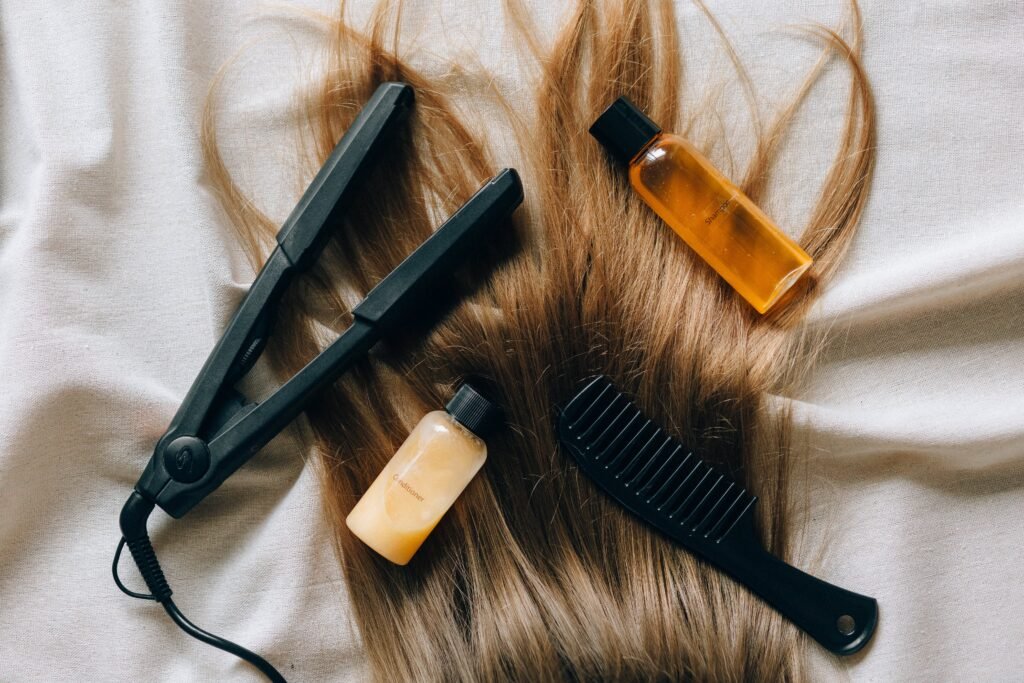You’re looking for the key to luscious, healthy locks, and it all starts with the right oils. Wondering which oils are the best to promote hair growth? Look no further. In this article, we’ll explore the top oils that have been proven to nourish your hair, enhance its growth, and leave you with the beautiful mane you’ve always dreamed of. Say goodbye to dryness, breakage, and lackluster hair – it’s time to unlock the secrets of these remarkable oils and unleash the potential of your tresses.

Introduction
Having healthy, luscious hair is something that many of us strive for. Whether you’re dealing with hair loss, thinning hair, or simply want to enhance your hair’s natural growth, incorporating oils into your haircare routine can be incredibly beneficial. Oils have been used for centuries to nourish and promote hair growth, and today we’re going to explore some of the best oils for promoting healthy hair growth. From coconut oil to tea tree oil, each oil has its own unique properties and benefits. So, let’s dive in and discover the power of these oils for your hair!
1. Coconut Oil
Coconut oil has gained immense popularity in the health and beauty industry, and for good reason. Not only is it a versatile oil for cooking and skincare, but it also has incredible benefits for hair growth. Coconut oil is rich in healthy fats, vitamins, and minerals that nourish the hair follicles and promote hair growth.
1.1 Benefits of Coconut Oil for Hair Growth
The benefits of coconut oil for hair growth are numerous. Firstly, it penetrates deep into the hair shaft, moisturizing and strengthening each strand from within. This helps prevent breakage and promotes longer, healthier hair. Coconut oil also has antimicrobial properties, which can help fight scalp infections and dandruff, creating a healthier environment for hair growth. Additionally, coconut oil adds shine to the hair, making it look more vibrant and healthy.
1.2 How to Use Coconut Oil for Hair Growth
Using coconut oil for hair growth is simple. You can either apply it directly to your scalp and hair as a pre-shampoo treatment or mix it with your conditioner for added hydration. Massage the oil into your scalp for a few minutes to stimulate blood flow and promote optimal hair growth. Leave the oil on for at least 30 minutes before washing it out. For best results, incorporate coconut oil into your haircare routine at least once a week.
1.3 Precautions with Coconut Oil
While coconut oil is generally safe to use, it’s important to note that it may not be suitable for everyone. If you have allergies to coconuts or have excessively oily hair, coconut oil may not be the best option for you. Additionally, make sure to use pure, organic coconut oil to reap the full benefits and avoid any potential irritations or side effects. As with any new product, it’s always a good idea to do a patch test before applying it to your entire scalp.
2. Argan Oil
Another oil that is highly regarded for promoting healthy hair growth is argan oil. Originating from the kernels of the Moroccan Argan tree, argan oil is rich in essential fatty acids, vitamins, and antioxidants that nourish the hair and scalp.
2.1 Benefits of Argan Oil for Hair Growth
Argan oil is known for its ability to moisturize and hydrate the hair, making it an excellent choice for those with dry or damaged hair. It helps repair split ends and prevents further breakage, promoting stronger, longer hair. The high vitamin E content in argan oil also helps boost circulation to the scalp, stimulating hair follicles and promoting healthy hair growth.
2.2 How to Use Argan Oil for Hair Growth
To use argan oil for hair growth, simply warm a few drops of the oil in your palms and apply it to your scalp and hair. Gently massage it in, focusing on areas where you want to promote hair growth. Leave the oil on overnight for deep nourishment, or rinse it out after a few hours. For added benefits, you can also mix argan oil with your shampoo or conditioner. Incorporate argan oil into your haircare routine 2-3 times a week for best results.
2.3 Precautions with Argan Oil
Argan oil is generally safe for most people to use, but it’s important to ensure that you’re using pure, high-quality argan oil. Be cautious of counterfeit products that may contain additives or fillers. As with any new product, test argan oil on a small patch of skin to check for any allergic reactions. If you have any underlying scalp conditions or allergies, consult with a dermatologist or hair care professional before incorporating argan oil into your routine.
3. Castor Oil
Castor oil, derived from the seeds of the Ricinus communis plant, is another oil that has been widely used for hair growth. It has unique properties that make it particularly beneficial for those looking to nourish their hair and stimulate growth.
3.1 Benefits of Castor Oil for Hair Growth
Castor oil is rich in ricinoleic acid, a fatty acid that has anti-inflammatory and antimicrobial properties. These properties help in maintaining a healthy scalp and combating scalp infections that can hinder hair growth. Castor oil also contains omega-6 and omega-9 fatty acids, which nourish the hair follicles and promote healthy hair growth. Additionally, castor oil has a thick consistency that coats the hair shaft, preventing moisture loss and reducing frizz.
3.2 How to Use Castor Oil for Hair Growth
To use castor oil for hair growth, start by warming a small amount of oil in your palms. Massage it into your scalp, focusing on areas that need extra nourishment or where you want to promote hair growth. Leave the oil on for at least a few hours or overnight for maximum benefit. Castor oil is quite thick, so you may need to shampoo your hair twice to remove it completely. For best results, incorporate castor oil into your haircare routine 1-2 times a week.
3.3 Precautions with Castor Oil
While castor oil is generally safe to use, some people may be allergic to it or experience scalp irritation. It’s always recommended to do a patch test before using castor oil on your scalp. Additionally, it’s important to use cold-pressed, organic castor oil to ensure that you’re getting the highest quality product. If you have any existing scalp conditions or concerns, it’s best to consult with a dermatologist before using castor oil.

4. Olive Oil
Olive oil, a staple in Mediterranean cuisine, is not just great for cooking but also for promoting healthy hair growth. It has been used for centuries as a beauty remedy, and its benefits for hair are widely recognized.
4.1 Benefits of Olive Oil for Hair Growth
Olive oil is packed with antioxidants, vitamins, and minerals that nourish and strengthen the hair follicles. This promotes healthier hair growth and can help prevent hair loss and thinning. Olive oil also provides deep hydration to the hair, making it softer and more manageable. Its anti-inflammatory properties can help soothe an irritated scalp and reduce dandruff, creating an optimal environment for hair growth.
4.2 How to Use Olive Oil for Hair Growth
To use olive oil for hair growth, warm a few tablespoons of olive oil and apply it to your scalp and hair. Massage it in for a few minutes to stimulate blood flow and maximize absorption. Leave the oil on for at least 30 minutes or overnight for deep conditioning. Rinse it out thoroughly and shampoo as usual. For best results, incorporate olive oil into your haircare routine once or twice a week.
4.3 Precautions with Olive Oil
Olive oil is generally safe to use, but it’s important to note that it can weigh down fine or thin hair. If you have such hair type, use olive oil sparingly or mix it with a lighter oil, such as jojoba oil, to avoid making your hair greasy. Additionally, make sure to use extra virgin or cold-pressed olive oil as these types retain the highest levels of nutrients. If you have any known allergies to olives or olive oil, it’s best to avoid using it on your hair.
5. Jojoba Oil
Jojoba oil, derived from the seeds of the jojoba plant, is an excellent oil for promoting healthy hair growth. It has a composition similar to our scalp’s natural oils and has been used for centuries in hair and skincare products.
5.1 Benefits of Jojoba Oil for Hair Growth
Jojoba oil is a lightweight oil that is easily absorbed by the scalp and hair. It provides deep hydration without making the hair greasy, making it suitable for all hair types. Jojoba oil also helps regulate sebum production, keeping the scalp balanced and preventing excessive oiliness or dryness. This creates an optimal environment for healthy hair growth. Additionally, jojoba oil can help repair damaged hair, reduce frizz, and add shine to the hair.
5.2 How to Use Jojoba Oil for Hair Growth
To use jojoba oil for hair growth, warm a few drops of oil in your palms and apply it to your scalp and hair. Massage it in to ensure even distribution. Leave the oil on for a few hours or overnight for deep hydration. Jojoba oil can also be mixed with your favorite shampoo or conditioner for added benefits. Incorporate jojoba oil into your haircare routine 2-3 times a week for optimal results.
5.3 Precautions with Jojoba Oil
Jojoba oil is generally safe to use, but it’s important to note that some people may experience an allergic reaction to it. Always do a patch test before using jojoba oil on your scalp to check for any adverse reactions. Additionally, be cautious of using too much jojoba oil, as it can make the hair appear greasy if over-applied. Start with a small amount and adjust as needed based on your hair’s individual needs.

6. Peppermint Oil
Peppermint oil has long been known for its soothing and refreshing properties. When it comes to hair growth, peppermint oil can work wonders in stimulating your scalp and promoting healthy hair growth.
6.1 Benefits of Peppermint Oil for Hair Growth
Peppermint oil has a cooling effect on the scalp when applied topically. This can help improve blood circulation and stimulate the hair follicles, leading to increased hair growth. Peppermint oil also has antiseptic properties, which can help maintain a clean and healthy scalp, free from any bacterial or fungal infections. Additionally, the menthol in peppermint oil can help soothe an itchy scalp and reduce dandruff.
6.2 How to Use Peppermint Oil for Hair Growth
To use peppermint oil for hair growth, mix a few drops of peppermint oil with a carrier oil, such as coconut or jojoba oil. Massage the mixture into your scalp, paying special attention to areas where you want to promote hair growth. Leave the oil on for at least 30 minutes before washing it out. You can also add a few drops of peppermint oil to your shampoo or conditioner for added benefits. Incorporate peppermint oil into your haircare routine 1-2 times a week.
6.3 Precautions with Peppermint Oil
Peppermint oil is generally safe to use, but it’s important to remember that it is highly concentrated and should always be diluted with a carrier oil. Avoid applying pure peppermint oil directly to the scalp, as it can cause irritation or skin sensitivity. Additionally, if you have any known allergies to mint or peppermint, it’s best to avoid using peppermint oil on your hair.
7. Rosemary Oil
Rosemary oil has been used for centuries as a natural remedy for hair growth and scalp health. Its unique properties make it an excellent choice for those looking to promote healthy hair growth.
7.1 Benefits of Rosemary Oil for Hair Growth
Rosemary oil has been found to increase blood circulation to the scalp, stimulating the hair follicles and promoting hair growth. It also has antibacterial and antifungal properties, which can help maintain a healthy scalp and prevent any scalp infections that may hinder hair growth. Additionally, rosemary oil has a pleasant aroma and can be used as a natural alternative to synthetic fragrances in hair products.
7.2 How to Use Rosemary Oil for Hair Growth
To use rosemary oil for hair growth, mix a few drops of rosemary oil with a carrier oil, such as olive or jojoba oil. Massage the mixture into your scalp, focusing on areas where you want to promote hair growth. Leave the oil on for at least 30 minutes or overnight, depending on your preference. For added benefits, you can also add a few drops of rosemary oil to your shampoo or conditioner. Incorporate rosemary oil into your haircare routine 2-3 times a week for optimal results.
7.3 Precautions with Rosemary Oil
Rosemary oil is generally safe to use, but it’s important to note that it may cause skin irritation in some individuals. Always do a patch test before using rosemary oil on a larger area to check for any adverse reactions. If you have any known allergies to rosemary or other herbs in the mint family, it’s best to avoid using rosemary oil on your hair. Additionally, avoid using rosemary oil during pregnancy or if you have any underlying medical conditions without consulting with a healthcare professional.
8. Almond Oil
Almond oil is another fantastic oil for promoting healthy hair growth. Extracted from the kernels of almonds, almond oil is packed with vitamins, minerals, and healthy fats that nourish and strengthen the hair.
8.1 Benefits of Almond Oil for Hair Growth
Almond oil is rich in vitamin E, which is essential for healthy hair growth and preventing hair loss. It nourishes the hair follicles, stimulates blood flow to the scalp, and strengthens the hair strands. Almond oil also moisturizes the hair, reducing frizz and adding shine. It can help repair damaged hair, making it more manageable and healthy-looking.
8.2 How to Use Almond Oil for Hair Growth
To use almond oil for hair growth, warm a few tablespoons of oil and apply it to your scalp and hair. Massage it in, focusing on areas where you want to stimulate hair growth. Leave the oil on for at least 30 minutes or overnight for deep nourishment. Rinse it out thoroughly and shampoo as usual. For maximum benefits, incorporate almond oil into your haircare routine 2-3 times a week.
8.3 Precautions with Almond Oil
Almond oil is generally safe to use, but it’s important to avoid it if you have a known allergy to almonds. Always do a patch test before using almond oil on a larger area to check for any adverse reactions. Additionally, opt for cold-pressed or organic almond oil to ensure that you’re getting the highest quality product. If you have any underlying scalp conditions or concerns, consult with a dermatologist before incorporating almond oil into your routine.
10. Tea Tree Oil
Tea tree oil is a powerful essential oil that has gained popularity for its numerous benefits, including promoting healthy hair growth. Derived from the leaves of the Melaleuca alternifolia tree, tea tree oil has antimicrobial and anti-inflammatory properties that can benefit both the scalp and hair.
10.1 Benefits of Tea Tree Oil for Hair Growth
Tea tree oil has antifungal and antibacterial properties, making it effective in treating scalp conditions such as dandruff and scalp acne. By keeping the scalp clean and free from infections, tea tree oil creates an optimal environment for healthy hair growth. It can also help unclog hair follicles and reduce inflammation, allowing for better nutrient absorption and hair growth. Additionally, tea tree oil has a cooling sensation that can soothe itchy scalps and reduce scalp irritation.
10.2 How to Use Tea Tree Oil for Hair Growth
To use tea tree oil for hair growth, mix a few drops of tea tree oil with a carrier oil, such as coconut or jojoba oil. Massage the mixture into your scalp, focusing on areas that need extra care or where you want to promote hair growth. Leave the oil on for at least 30 minutes before rinsing it out. For added benefits, you can also add a few drops of tea tree oil to your shampoo or conditioner. Incorporate tea tree oil into your haircare routine 1-2 times a week.
10.3 Precautions with Tea Tree Oil
Tea tree oil is generally safe to use, but some individuals may be sensitive or allergic to it. Always perform a patch test before using tea tree oil on a larger area of your scalp to check for any adverse reactions. When using tea tree oil, it’s important to dilute it with a carrier oil, as it can be too strong on its own and may cause skin irritation. If you have any known allergies or sensitivities to tea tree oil, it’s best to avoid using it on your hair.

